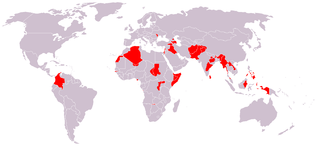Should a little war stop your Adventure?
 Picking up where I left off (sort of) on Adventures in a non-militarized world, I decided to see what Wikipedia had to offer on current, ongoing conflicts in the world. As usual, Wiki is great starting place, but the primo info is on the provided links. Particularly, the History guy link.Anyhow, this poses the inevitable question of when should armed conflict brand a place as off-limits for adventure? Depends on your level of adventurousness, obviously. I’m sure there are a few of us out there who would think nothing of walking into to downtown Baghdad tomorrow. The rest of us probably place our boundaries somewhere between sanity and Kurdistan.
Picking up where I left off (sort of) on Adventures in a non-militarized world, I decided to see what Wikipedia had to offer on current, ongoing conflicts in the world. As usual, Wiki is great starting place, but the primo info is on the provided links. Particularly, the History guy link.Anyhow, this poses the inevitable question of when should armed conflict brand a place as off-limits for adventure? Depends on your level of adventurousness, obviously. I’m sure there are a few of us out there who would think nothing of walking into to downtown Baghdad tomorrow. The rest of us probably place our boundaries somewhere between sanity and Kurdistan.
So for those of us without a death wish, where do you draw the line? For example, Nepal’s civil war has been ongoing for a decade and appears to be nearly over, but it hardly stemmed the tide of trekkers into the Himalayas or backpackers to Kathmandu. On the other hand, Muslim separatist bombings in the south of Thailand have taken the area off many travel itineraries, perhaps because of a bit of western paranoia regarding all things Muslim?
The message, I think is that it is all about perception. For example, ever heard of the Waziristan War? Sounds like something localized, maybe an old tribal thing, right? What if I told you it was a battle in Pakistan involving Taliban and Al-Qaeda insurgents since 2003? There’s a couple of hot-button names that add a little extra spookiness to the situation. But move to the South and we come across the conflict in Balochistan, which actually is a largely tribal thing involving control of oil and gas fields.
Now, if we bring in the African wars in places like Darfur, Congo and the Ivory Coast we get an entirely different image altogether, with most of this wars being truly ethnic in nature, but also quite unchecked by any international pressure.
When it comes to travel in these areas, the best advice is always to get as much of the word from the ground as you can. In some of the hairiest situations, like those in Africa, international aid groups will be able to paint you a pretty accurate picture, again if you can get ahold of their people on the ground. The suits in New York, London or Geneva might not give the best travel advice. But many of their field people are blogging, I’ll share some of their posts with you as I come across them.
Second best is to get the word from other travelers who can update you on situations, but may not be able to provide the context and understanding of an outsider who is living there.
You can always check in with government agencies, but remember, they operate in a world of liability, not adventure, so they’re likely to tell you that travel to South Dakota is too dangerous to try at the moment.
Just be smart, respectful and not stupid and you should stay safe.